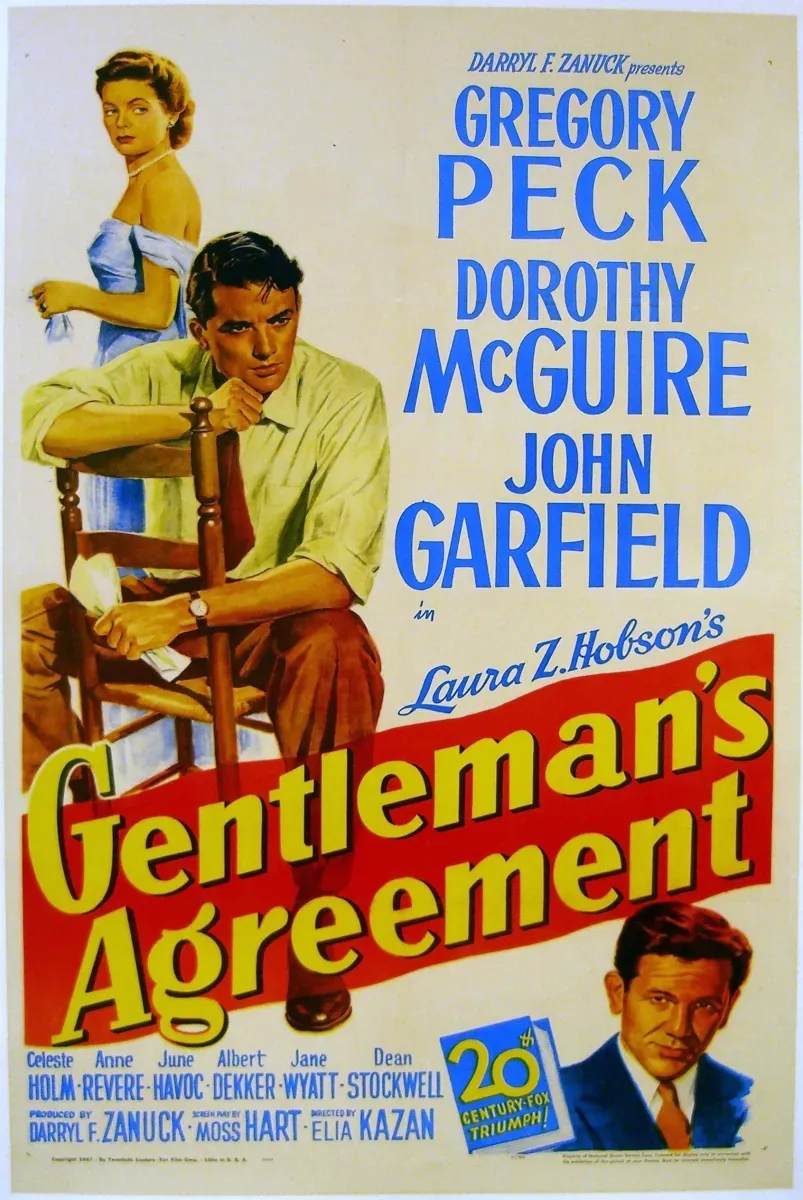
It was nominated for eight Academy Awards and won three: Best Picture, Best Supporting Actress (Celeste Holm), and Best Director (Elia Kazan). The film is praised for its powerful message about the pitfalls of unreasoning hate and bigotry, and it remains timely and relevant to this day. The performances of Gregory Peck and Dorothy McGuire are also highly acclaimed.
Gentleman's Agreement tells the story of a journalist named Philip Schuyler Green, who is assigned to write a series of articles on anti-Semitism in America. To get a firsthand experience of the issue, he decides to pose as a Jew and live among the Jewish community in New York City.
As he delves deeper into his research, he encounters various forms of discrimination and prejudice, including being denied entry to a hotel and being subjected to slurs and insults.
Philip's personal life is also affected by his experiment, as his fiancée and young son struggle to understand his motivations and the impact it has on their relationship. Meanwhile, his editor and friend, John Minify, faces pressure from his advertisers and colleagues to tone down the articles and avoid offending their readership.
As the series of articles is published, it causes a stir in the community and leads to a public debate on the issue of anti-Semitism. In the end, Philip's work helps to raise awareness and promote understanding, but not without personal and professional costs. The film ends with a message of hope and a call for people to stand up against bigotry and discrimination.
If the video doesn't play on your browser, try another one. The videos work with Opera, Firefox, Chrome, and Edge. Some films take a bit to load so be patient.
Director: Elia Kazan
Writer: Laura Z. Hobson, Moss Hart
Box Office Gross: 7.8 million USD
Genre: Drama
Distributor: 20th Century Fox
Release Date (Theaters): Nov 11, 1947
Release Date (Streaming): Mar 1, 2013
Gentleman's Agreement explores themes of prejudice, discrimination, and the courage to stand up for what is right. The film received a generally favorable reception, with influential New York Times critic Bosley Crowther praising it.
It was also nominated for eight Academy Awards and won three, including Best Picture and Best Director. The movie's success is attributed to its powerful themes, impactful characters, and the critical acclaim received by the performances of the cast, particularly Gregory Peck and Dorothy McGuire.
The film's enduring relevance and powerful message about the pitfalls of unreasoning hate and bigotry have contributed to its lasting impact. It remains a significant work in the history of American cinema, and in 2017, it was selected for preservation in the United States National Film Registry by the Library of Congress.
Prejudice and sensitivity: The film dealt with a sensitive topic, anti-Semitism, and the filmmakers had to be cautious not to offend or misrepresent the Jewish community. This was a concern, especially since Hollywood was historically hesitant to address Jewish issues, fearing backlash from the industry, which was primarily run by Jews.
Authenticity and accuracy: The film aimed to portray the harsh realities of anti-Semitism, and the filmmakers had to ensure that their depiction was accurate and respectful. This required extensive research and consultation with experts on the subject matter.
Casting: The film required strong performances from its cast, particularly from Gregory Peck, who played the lead role of Philip Schuyler Green. The filmmakers had to find an actor who could convincingly portray a journalist and a member of the Jewish community.
Balancing themes and storytelling: The film had to balance its powerful themes of prejudice and anti-Semitism with a compelling narrative that would engage the audience. This required careful scriptwriting and direction to ensure that the film was both informative and emotionally resonant.
Reception: The film's success depended on how it was received by the public and the critics. The filmmakers had to create a powerful and impactful film that would raise awareness about anti-Semitism and promote understanding, rather than alienating potential viewers.
The visual style of Gentleman's Agreement is characterized by its expressionist, near-noir shadows, which contribute to a genuine sense of darkness, reflecting the film's exploration of the true ugliness of anti-Semitism.
The setting of the film plays a crucial role in conveying the themes and messages. The movie effectively captures the affluent communities of New Canaan and Darien, Connecticut, as well as the vibrant and diverse neighborhoods of New York City, where the protagonist immerses himself in the Jewish community to experience firsthand the discrimination and prejudice prevalent at the time.
Here are some trivia about the film Gentleman's Agreement:
Creator Backlash: Despite winning an Oscar for his direction, Elia Kazan revealed in a later interview that he was not entirely satisfied with the film.
Impact on Attitudes: A study was conducted to assess the effects of the film on attitudes toward Jews. The results of the study were discussed in an academic paper, indicating the film's influence on perceptions and attitudes.
Production Changes: The production of the film involved various changes, including adjustments to the script and shifting the filming location.
The role of Phillip Green was first offered to Cary Grant, but he turned it down. Grant refused the role because he contended, he was Jewish and thought he looked Jewish. He maintained, "The public won't believe my portrayal of a gentile trying to pass himself off as a Jew." Tyrone Power was offered the role, but he turned it down in favor of The Razor's Edge